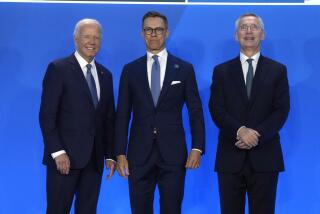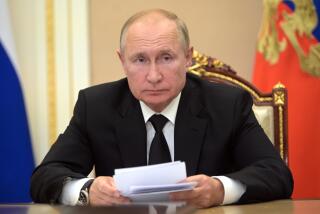Exxon Mobil teams up with Russia’s Rosneft in Arctic deal
- Share via
Exxon Mobil Corp. and Rosneft announced a pact to extract oil and natural gas from the Russian Arctic, the most significant U.S.-Russian corporate deal since President Obama’s push to improve ties.
The announcement ended any hope that Britain’s BP had of reviving its deal with state-owned Rosneft to develop the same Arctic territory. That deal was blocked in May by the billionaire partners in another BP Russian venture.
For Exxon, the pact gives the largest U.S. oil company access to substantial reserves in Russia, the world’s largest oil producer. For Rosneft, it’s about bringing in one of the few global players capable of drilling in the harsh, deep waters of the Arctic.
But the alliance is not without risk, and it comes after a patchy history for U.S. oil companies investing in Russia. However, Moscow has shown greater willingness in the last year to strike deals with foreign players, even if some of them later fell apart.
Russian Prime Minister Vladimir Putin attended the Tuesday signing in the Black Sea resort of Sochi by Exxon Chief Executive Rex Tillerson and Russia’s top energy official, Deputy Prime Minister Igor Sechin.
“New horizons are opening up. One of the world’s leading companies, Exxon Mobil, is starting to work on Russia’s strategic shelf and deep-water continental shelf,” Putin said.
Exxon and Rosneft agreed to invest $3.2 billion developing East Prinovozemelsky Blocks 1, 2, and 3 in the Arctic Kara Sea and the Tuapse licensing block in the Black Sea.
Rosneft will own 66.7% and Exxon the rest of a joint venture to develop the blocks, which Exxon said were “among the most promising and least explored offshore areas globally, with high potential for liquids and gas.”
“The fact that someone with the stature of Exxon Mobil is willing to give it a stab is very significant,” said Amy Myers Jaffe of the Baker Institute at Houston’s Rice University.
Under the deal, Rosneft will tap the offshore expertise of Exxon to open up one of the last unconquered drilling frontiers, while diversifying further outside Russia by getting a piece of Exxon’s U.S. developments.
“To get into Russia offshore you give up some of your domestic offshore. I think it’s a fair trade,” said Brian Youngberg, senior energy analyst at brokerage Edward Jones in St. Louis, who has a “hold” rating on Exxon shares.
The deal also demonstrated that the “reset” in relations sought by Obama was working to reduce the political risk for U.S. businesses operating in Russia.
“Three years ago, American companies were being excluded. Here, an American company is at the center of a flagship announcement. This deal demonstrates that ‘reset’ has had a positive effect on U.S.-Russia energy relations,” said Cliff Kupchan, director of Eurasian Practice at Eurasia Group.
Rosneft said the Kara Sea blocks contain an estimated 36 billion barrels of recoverable oil resources. Total resources were estimated at 110 billion barrels of oil equivalent — more than four times Exxon’s proven worldwide reserves.
The Black Sea block was estimated to hold 9 billion barrels of oil reserves. First drilling was planned to start in 2015, with Exxon shouldering most of the costs.
The deal marks a turnaround for Exxon in Russia. The Irving, Texas, oil giant was widely thought to be on the verge of taking over Yukos, then Russia’s largest oil firm, before Yukos’ head, Mikhail Khodorkovsky, was arrested in 2003. Khodorkovsky was subsequently jailed for fraud and tax evasion. Yukos’ prime assets were bought at bankruptcy auctions by Rosneft, now Russia’s industry leader with enough reserves to cover 27 years of production.
More to Read
Inside the business of entertainment
The Wide Shot brings you news, analysis and insights on everything from streaming wars to production — and what it all means for the future.
You may occasionally receive promotional content from the Los Angeles Times.










